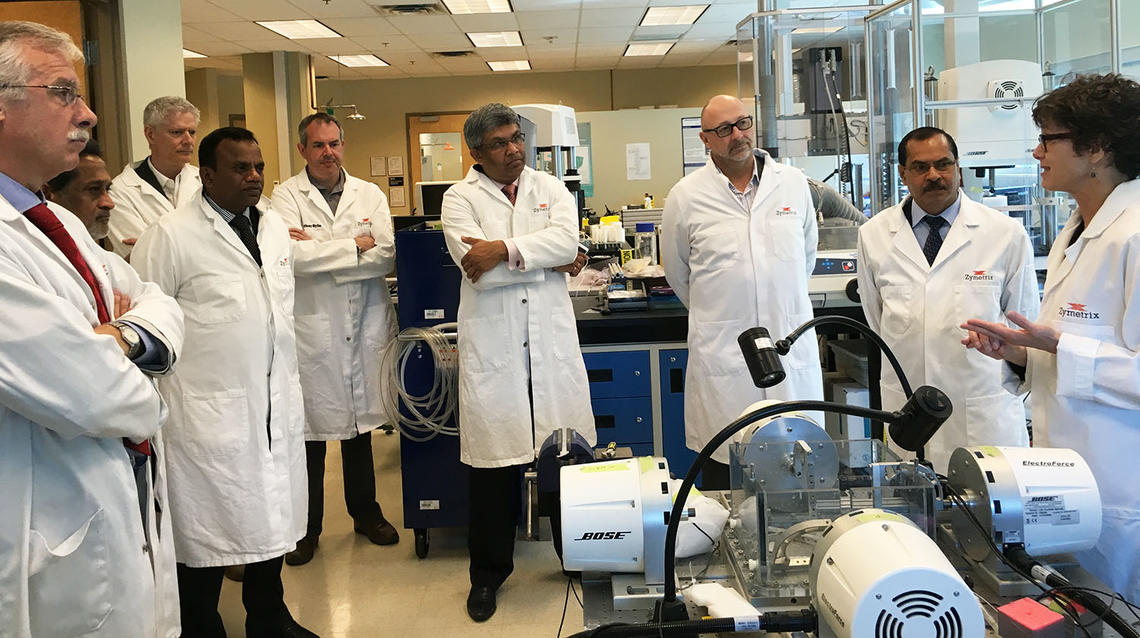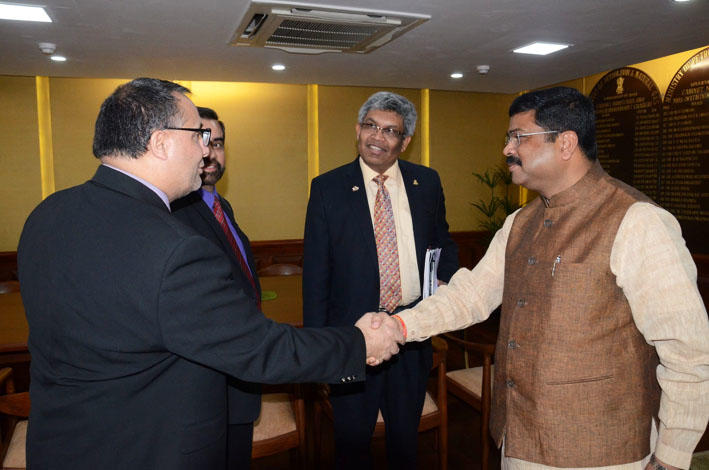May 24, 2016
University of Calgary's relationships with India are flourishing

Janet Ronsky, far right, gives a tour to KSR delegates in the Zymetrix Lab.
Relationships between the University of Calgary and India are thriving. Over the past two months, representatives from the University of Calgary have both travelled to and hosted visitors from India to discuss ways that we can collaborate and work towards specific project interests.
Most recently, the University of Calgary hosted the Shastri Indo-Canadian Institute’s president who gave a presentation to over 30 University of Calgary faculty members on grants for collaboration, and student and faculty mobility available with the Indian government. The University of Calgary is a member of the Shastri Institute and is the site of their Canadian head office. Funded by the governments of Canada and India, the Shastri Institute supports binational collaborations between academia, government, the business community and civil society organizations by funding research and hosting seminars.
Poised for opportunities in collaborative research and education
“I look forward to representing the University of Calgary and promoting the numerous scholarly, educational and cultural activities of the Shastri Institute in Canada and India,” says Anil Mehrotra, professor in the Schulich School of Engineering and recently appointed secretary-treasurer for the Shastri Institute. “I believe India is well poised to provide significant opportunities for collaborative research and educational activities, while also offering us a valuable training opportunity.”

From left: Ian Gates shakes hands with Dharmendra Pradhan, Anil Mehrotra, and Janaka Ruwanpura.
This event builds upon an earlier mission in March, when Mehrotra, Janaka Ruwanpura, vice-provost (international), and Ian Gates, department head, Chemical and Petroleum Engineering, travelled to India and met with Honorable Minister of State for Petroleum and Natural Gas Dharmendra Pradhan, Honorable Union Minister of Science and Technology and Earth Sciences Harsh Vardhan, Oil and Natural Gas Corporation (ONGC) and several institutions to discuss various opportunities for collaboration. A supplemental letter of agreement (SLOA) was also signed with Indian Institute of Technology Bombay (IIT), allowing student exchanges between the two institutions for engineering students.
“Through our International Strategy we have identified India as a country of interest where we want to increase our strategic partnerships and profile,” says Ruwanpura. “These agreements and meetings will help to increase the diversity of students on campus and advance educational and research partnerships.”
International, Engineering Solutions for Health strategies
Meetings were also held with K. S. Rangasamy College of Technology (KSR Group) to discuss opportunities to establish a research program and centre in bio engineering. In May, these discussions were continued when KSR Group travelled to Calgary for two days of meetings and lab tours with the Cumming School of Medicine, Schulich School of Engineering and the Faculty of Kinesiology. They met with various researchers involved in the Engineering Solutions for Health strategy.
In addition to these activities, the University of Calgary has been connecting with the Indian community in Calgary and recently hosted the Indo-Canada Chamber of Commerce (ICCC) Alberta Business Council Dinner on May 17. Sanjay Makkar, national president of ICCC, and Ruwanpura spoke to attendees about the increased relationships between the countries and the university and India.
The University of Calgary's ties with India include nine institutional agreements/collaborations, 29 faculty members who originate from India and 31 faculty members with at least one degree obtained from an Indian university. The university has approximately 305 students from India in our undergraduate and graduate programs and 19 students from India expected to arrive in spring and summer to complete internships through Mitacs Globalink.
